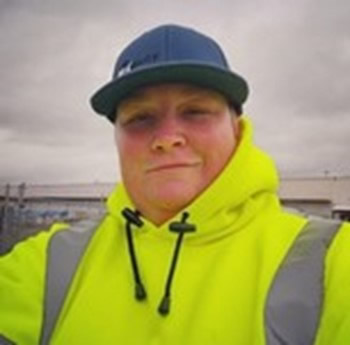
National Apprenticeship Week

We celebrated National Apprenticeship Week (NAW) this year from Nov. 14 to 20 with events and activities that showcased the value of pre-apprenticeship and Registered Apprenticeship programs in building a strong economy and a diverse workforce. The U.S. first observed NAW in 2015, when women made up only 9 percent of all Registered Apprentices. Today, women make up nearly 14 percent of active apprentices, and that number is growing. This week reminds us of the need to identify and address the discriminatory practices, systemic barriers and long-standing obstacles that prevent women from accessing the opportunities available through apprenticeship programs—and to continue advocating for policy changes that will help women secure jobs in male-dominated industries that pay higher, family-sustaining wages.
- Read the President's Proclamation on National Apprenticeship Week
- Explore the effects of occupational segregation on women’s economic security
National Women in Apprenticeship Day
Thirty years ago, the Women in Apprenticeship and Nontraditional Occupations Act (WANTO) was signed into law, thanks to the leadership of Congresswoman Constance A. Morella to support tradeswomen and facilitate more women entering nontraditional occupations. Since its enactment, WANTO has delivered job-related training to thousands of women. WANTO grantees provide supportive services like career counseling and mentoring to improve women’s retention in pre-apprenticeship and apprenticeship programs. They provide training and technical assistance to employers and unions working to create an environment for women to succeed. Through WANTO, women are gaining access to and succeeding in new industries.
Tradeswomen Spotlights

"Since graduating from ANEW, I [feel] like I finally have a career. Before the program...every paycheck was a struggle. Now I work for one of the best companies, McKinstry. [I'm] so very thankful for the staff at ANEW and all the support they gave me to succeed. Looking forward to getting in the apprenticeship program as a commercial plumber. Don’t know where I would be without the amazing opportunity ANEW has given me!"
–Georgia Zimmerman, Pre-Apprenticeship Construction Education
Apprenticeship and Nontraditional Employment for Women (ANEW), WANTO grantee

"I have never experienced an environment like this before where women were helping each other instead of fighting to get ahead. They give chances to people that might not ever have had any. If Oregon Tradeswomen didn’t take a chance on me, I wouldn’t be where I am today. ...My biggest achievement is learning who I am supposed to be...being in the construction world has been that piece that I was missing."
–Jamie Jarrett, 4th Term Electrical Apprentice
Oregon Tradeswomen, WANTO grantee

"I was just a mediocre student. I had ADD and a learning disability and getting through college was a struggle. I got the degree, but it was still a struggle to earn a living wage. One day while chatting with an IBEW electrician, I learned about Oregon Tradeswomen’s pre-apprenticeship program. I applied immediately. It’s challenging work that’s different every day and I love that you get a final product so immediately. Every time I leave the job site there is something new there that will probably outlast me."
–Liz Nichols, Cement Mason
Oregon Tradeswomen, WANTO grantee

"I was fresh out of prison and looking for a future I could do. I saw a sign advertising ANEW and I got a feeling that I can do this. It was so much more than I anticipated. I found a supportive group of women who all wanted good things for their futures. Today it’s me living with my 3 kids and paying bills. I have something I’ve never had, a path to self-sufficiency. I’m proud of myself and amazed and grateful to this program."
–Melissa Godsey, Trades Rotation Program
Apprenticeship and Nontraditional Employment for Women (ANEW), WANTO grantee
Events and Partnerships

Asian American, Native Hawaiian, and Pacific Islander Family Caregivers Roundtable
This month, Women’s Bureau Director Wendy Chun-Hoon joined a group of Asian American, Native Hawaiian, and Pacific Islander (AA and NHPI) caregivers and subject matter experts for an in-person roundtable at The White House. Care work has historically been devalued and care workers are often underpaid and overburdened. AA and NHPI caregivers and care workers also deal with other challenges, including lack of access to and limited availability of in-language resources, insufficient culturally competent health systems, and the rise of anti-Asian racism in recent years. This discussion provided an opportunity for the Biden-Harris Administration to hear first-hand some of the issues paid and unpaid caregivers encounter and identify opportunities for intervention.
Bold on Early Educator Compensation: Lessons from States Taking Action
On Nov. 2, the Women’s Bureau joined the Center for the Study of Child Care Employment–Berkeley University to host a conversation on advancing meaningful compensation reform for early educators. Childcare workers receive among the lowest wages of any occupation in the country and are over twice as likely to live below the poverty line compared to workers in other sectors. More than 15% of childcare workers live below the poverty line in 41 states, and the United States is now experiencing a shortage of early educators. Webinar participants discussed strategies for improving pay and working conditions in this women-dominated sector and reinforced the fact that supporting early educators is a matter of racial and gender justice.
Celebrating Women Veterans – She Served, Too!
This year, in honor of Veteran’s Day and as part of our workplace equity series, the Women’s Bureau hosted a webinar to commemorate women veterans who have dedicated their lives to military service but encounter obstacles transitioning from military to civilian life. According to recent research, one of the top challenges is finding employment, with women veterans feeling they are not adequately prepared for civilian careers and wanting better support with resume building, interviewing, and navigating the civilian workplace. In partnership with other agencies at the Department of Labor, the Department of Veterans Affairs, Hiring Our Heroes, and Work For Warriors, the Women's Bureau shared career resources, offered information about obtaining access to benefits, updated participants on educational opportunities, and highlighted workplace rights.
Swiss Embassy National Apprenticeship Week Event
Women's Bureau Acting Deputy Director Tiffany Boiman spoke at the Embassy of Austria’s 8th Annual National Apprenticeship Week event, organized in cooperation with the Embassy of Switzerland and Advantage Austria. She talked about the urgency, given recent infrastructure investments, of facilitating women’s entry into good-paying jobs with benefits and opportunities for advancement, including industries and occupations where they traditionally have been under-represented. Boiman stressed the need to leverage funding from the Bipartisan Infrastructure Law, Inflation Reduction Act and CHIPS and Science Act to create and expand apprenticeable career pathways for women.
Women in Apprenticeship: Building Our Power
To mark National Women in Apprenticeship Day, which usually falls on Thursday of National Apprenticeship Week, Women’s Bureau Director Wendy Chun-Hoon moderated a panel discussion about the work being done to expand pathways for women in the workforce through apprenticeship. Over the last 30 years women’s representation in apprenticeship programs and jobs in the trades has doubled, reaching its highest level ever in 2021. While the numbers of women overall – and Black and Latina apprentices, specifically – have increased, they are still too low. Speakers discussed how government funding through the Infrastructure Investment and Jobs Act can be used to help promote gender equity in pre-apprenticeship and apprenticeship programs.
November Observances

National Veteran and Military Families Month
November is Military Family Appreciation Month, and Nov. 11 is Veterans Day, both of which are a great opportunity to honor the contributions of veterans and their families to the nation and our workforce. Are you a woman veteran small business owner? Your local Women's Business Center offers resources and guidance to support you and your business based on your community's needs.
National Family Caregivers Month
November is National Family Caregivers Month and we're not stopping our work to ensure women are aware of the family-friendly policies, work-place flexibilities and other work-life benefits that can help them manage work obligations and caregiving responsibilities. We're also continuing to advocate for a national care system that can help build an economy that works for women.
- See how the Family and Medical Leave Act applies to you
- Explore the Administration for Community Living's resources for family caregivers
- Access federal resources for women
Transgender Awareness Week and Day of Remembrance
Each year, we observe Transgender Awareness Week Nov. 13–19 and Transgender Day of Remembrance on Nov. 20 to honor the experiences of trans, nonbinary and gender nonconforming individuals. These dates are an important reminder to keep fighting against discrimination and other forms of oppression within and outside the workplace. Through our work, we advance equity and inclusion for all communities and promote opportunities for all workers regardless of gender, sexual orientation, gender identity or gender expression.
In Case You Missed It

Request for Information: Data
The Department of Labor wants to hear from you as part of an effort to expand public access to Federal data in a way that reflects public interests and serves public needs.

Worker Rights
Do you have questions about your rights as an employee, want to find out more about common workplace concerns, and are interested in learning about the laws that protect you?

New DOL grant: Nursing Expansion Grant Program
The Department of Labor recently announced $80 million in grant funding to support nursing training programs for future nurses from historically underrepresented populations and underserved communities.
WB in the News
Women in apprenticeship – creating pipelines to economic security
- Another Voice: Dismantling barriers to apprenticeship | The Buffalo News
- Apprenticeship changes lives – especially for women | Independence Bulletin Journal
- Apprenticeship changes lives – especially for women | Minot Daily News
- Apprenticeships help tear down barriers for women in the workplace | The Seattle Times
- Commentary: Gina Rodriguez – Apprenticeship changes lives, especially for women | My Journal Courier
- Changing Lives | Norfolk Daily News
- GUEST COLUMN: Women should take more apprenticeships | Beaumont Enterprise
- Regional View: Apprenticeships change lives – especially for women | Duluth News Tribune
- Removing the barriers for female apprentices | The Sentinel-Record
- Rodriguez: Apprenticeship changes lives – especially for women | Pharos Tribune
Infrastructure jobs for tradeswomen
Upcoming Events

Equity Series: Tipped Workers in the Restaurant Industry – Challenges and Solutions
Join us to discuss the challenges tipped workers face in the restaurant industry, learn about workers’ rights and protections, and explore solutions for increasing workers’ security.
Uniting to End Gender-Based Violence and Harassment: The Impact of Worker-Centered Education and Awareness
Join us to hear from guest speakers, including workers, who will share successful methods they've used to raise awareness about gender-based violence and harassment in the world of work and programs they've put in place to prevent and address it.
We Want to Hear from You!

“Occupational segregation” is the gendered sorting of men and women into different types of jobs. It leads to women being overrepresented in certain jobs, which are valued and compensated less than male-dominated jobs.
We’ve heard from many working women about their experiences with gendered job expectations, the challenges they face at work, the support systems that help them thrive and the policy changes that would help them succeed. We'd like to hear from you.
Follow the Women's Bureau on Twitter: @WB_DOL

The Women’s Bureau has championed the rights of working women and served as a convener of conversations critical to an equitable economy for women for more than 100 years.
Follow us at @WB_DOL to view our #ThrowbackThursday series highlighting pioneering women, and to learn more about the latest research, initiatives, policies and updates related to working women and their families.
FOR MORE INFORMATION CONTACT:
U.S. Department of Labor - Women's Bureau - 200 Constitution Ave NW - Washington, DC 20210
202-693-6710 (telephone) - 202-693-6725 (fax) - www.dol.gov/agencies/wb
